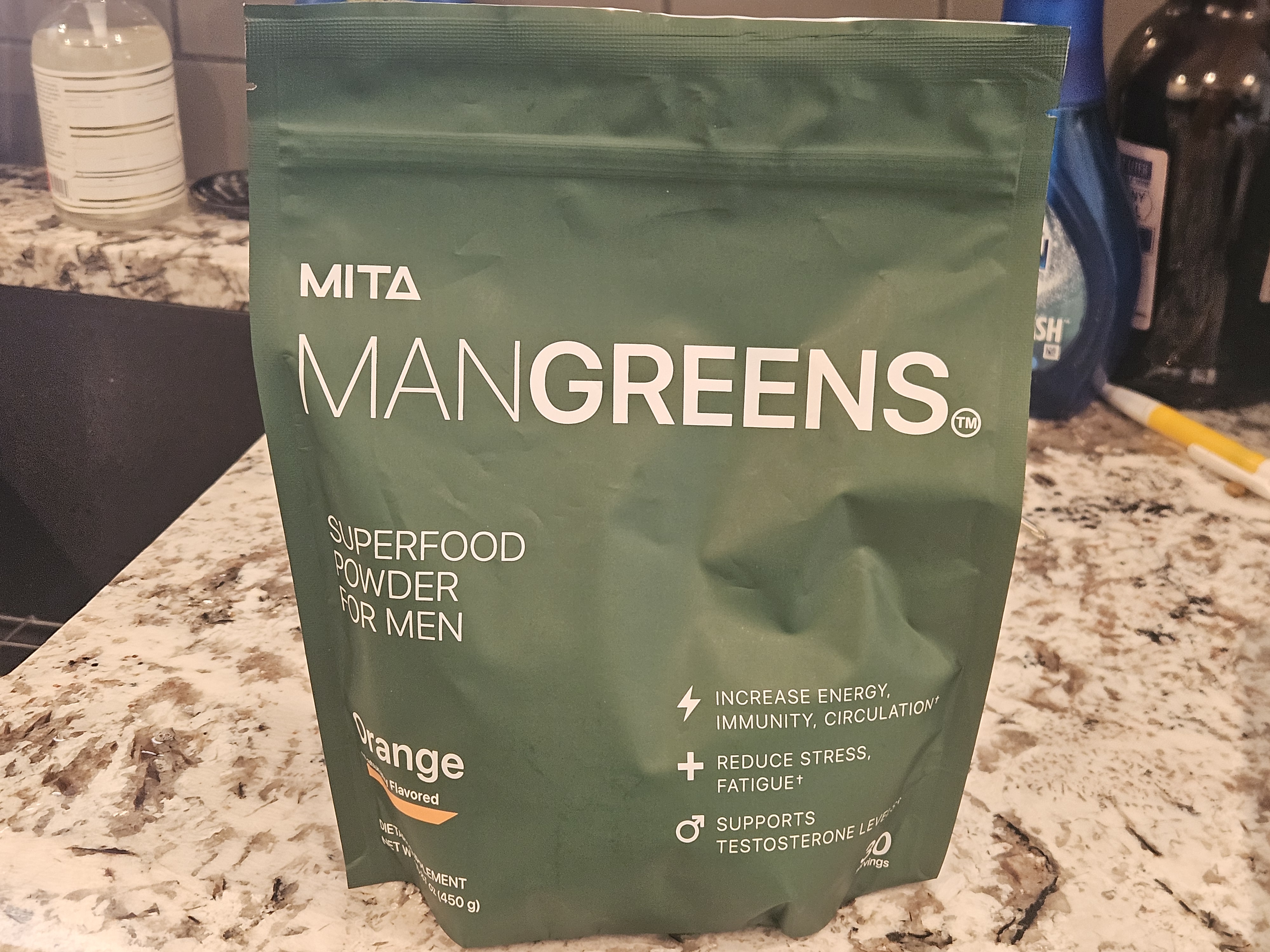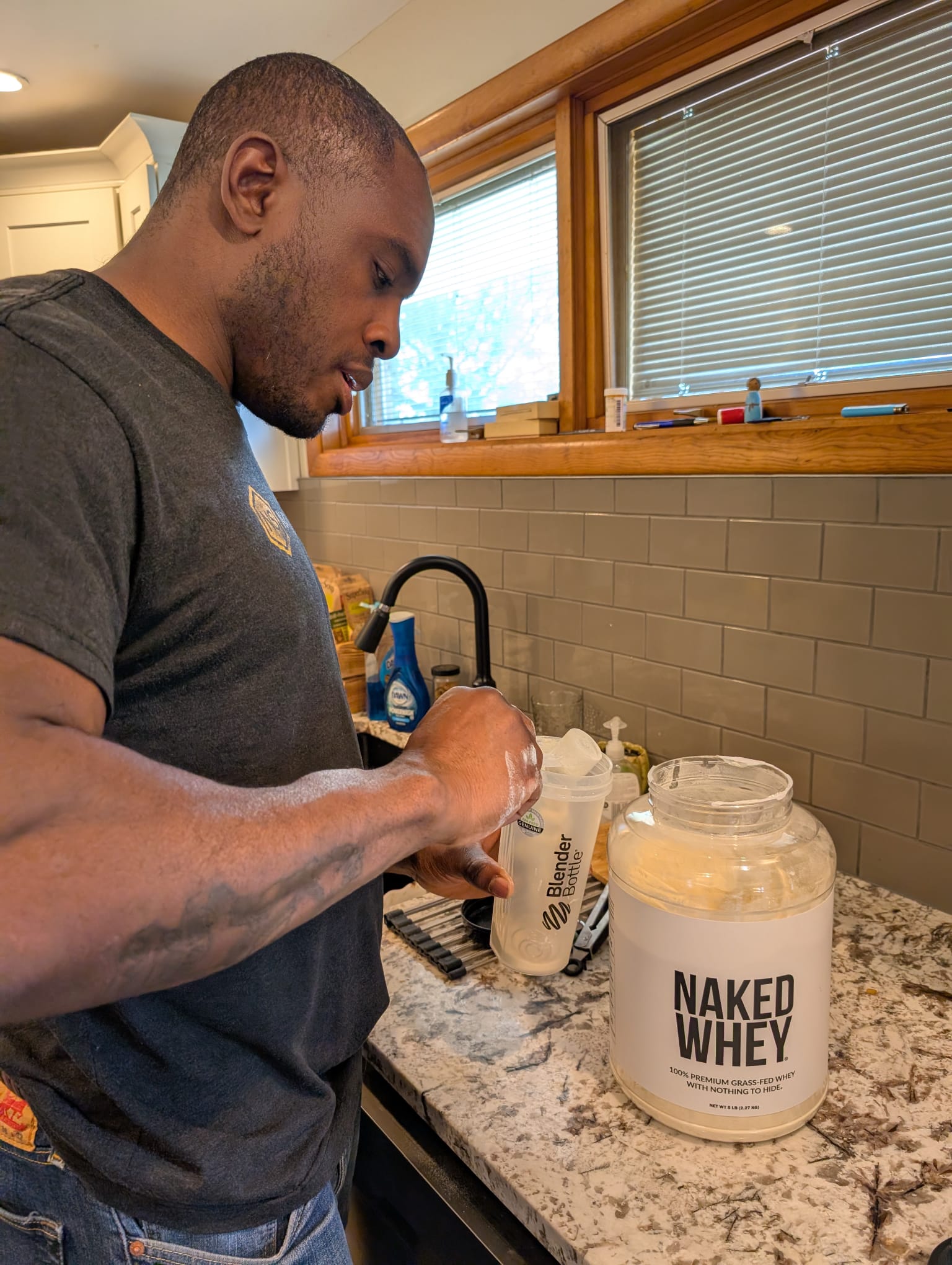I’m a former National Champion amateur boxer and top-level professional heavyweight boxer who still regularly has intense training sessions, sparring sessions, and coaches aspiring amateur fighters.
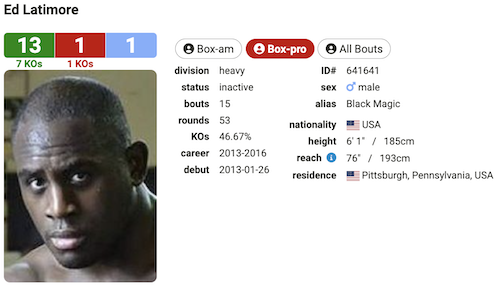
I even work with people who just want to try the sport out Because of my experience as a professional boxer and a coach, I can give you a unique perspective on the best boxing gloves you can buy to start your boxing journey.
[Read about why I decided to start fighting in the first place—>Why I Started Boxing]
I put this list together assuming that you take your training seriously. Otherwise, spending money on a pair of boxing gloves—especially quality ones—is just a waste.
I’m not saying that you have to become a professional boxer. I just don’t see any difference between beginner’s boxing gloves and training gloves that experienced boxers practice in.
High-quality boxing gear is a non-negotiable
If you take up the sport of boxing, you should have high-quality gear. This means owning some excellent gloves. With this in mind and from looking over other articles (not written by professional boxers, mind you), this article is organized as follows:
I’ll give my best recommendations for the different situations and scenarios you encounter in a boxing gym. My recommendations are broken down by style of glove, purpose of glove, and price.
Anyone in the boxing gym needs a high-quality pair of boxing gloves. Or, at the very least, you have to ensure that you have the best gloves they can afford. It doesn’t matter whether you’re:
- An amateur boxer
- A professional boxer
- Using boxing workouts at home or in the gym to get in shape
- Just trying out the sweet science as a hobby
This list is for you. More importantly, this list is timeless.
Other lists that recommend gloves are put together just to make an affiliate commission. They’re written by people who have never even stepped into a boxing gym, let alone ever taken a fight.
As a result, they think the recommendations for good gloves change each year. Or worse, they only recommend brands that offer a commission (many of the top brands don’t offer a commission),
This article has my recommendations, but I also devoted a lot of space to teaching you how to select gloves for sparring, gloves for training, or boxing gloves to just hit the heavy bag with. This way, if you don’t like my recommendations, you at least don’t buy a low-quality boxing glove.
And lastly, if my recommendations help you to make a decision, I’d love for you to purchase through my link. I’ll get a small affiliate commission at no extra cost to you.
Also, if you’re new to boxing, only been in the gym a few days/weeks, or you don’t feel like you’re progressing fast enough, I highly recommend you check out any of the videos in Tom Yankello’s World Class Boxing Academy.
You might think I’m biased because Tom is my coach, by he’s also a coach with 30 years of experience coaching guys to the top level with many accomplishments including:
- 2025 National Italian American Hall of Fame
- 2025 Pennsylvania Sports Hall of Fame
- 2022 Pennsylvania Boxing Hall of Fame
- 2014 Beaver County Sports Hall of Fame
- 2007/2008 Honorable Mention to Official Top 5 Trainers in the World by Doug Fischer, Ring Magazine
- “Tom Yankello teaches boxing the right way.” – Roy Jones Jr., former four-division world champion and one of the greatest pound-for-pound boxers in history
- “Smartest trainer in boxing, period.” – Paul Spadafora, former IBF Lightweight World Champion and undefeated in 49 professional fights
- “If I were managing a fighter & needed a trainer who could take us all the way, Tommy Yankello would be on my short list. What he does with his talent is very impressive. His passion & enthusiasm for the sport, & his commitment to his fighters, is as good as anybody’s.” – Joe Tessitore, ESPN Boxing
There aren’t many people in the world who know more about boxing that Tom Yankello—and he’s one hell of a teacher as well. Check out his courses here.
[Learn more about my boxing training—>How To Train For A Professional Fight]
A word to other combat sports athletes and legit fighters
I’m not an MMA guy, but I’ve worked with enough legit fighters to tell you that this list works for you as well, but with a small caveat. MMA gloves are small and are open-palm. While I wouldn’t recommend hitting the heavy bag with MMA gloves, some guys do.
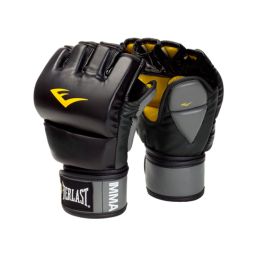
With that said, my recommendations for bag gloves will be suitable for you as well. If you’re just training your stand-up sparring or doing a bag workout, these boxing glove recommendations hold for you as well.
For the kickboxers and Muay Thai guys, this list works for you, as those disciplines also use boxing gloves. This isn’t necessarily true for all martial arts that use sparring gloves (karate gloves are closer to mixed martial arts gloves than boxing gloves, in my opinion). I’m not familiar with all of the different martial arts practices out there, so make sure you do your homework.
Also, this article was written with teenagers and older in mind.
As I’m writing this article by testing bag and fighting gloves and my own collection, I don’t have any recommendations for children’s gloves. That said, most fighting gloves don’t work based on age but rather on hand size.
Most of my recommendations here have a sizing option for children. At the very least, a basic sizing chart can help determine the best size.
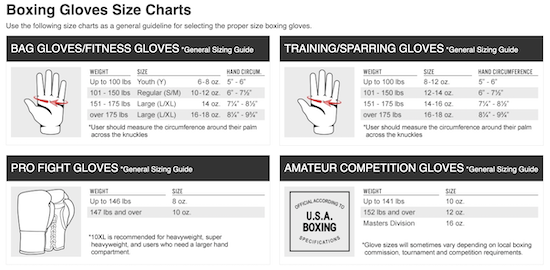
For everyone else, I know that buying boxing gloves for the first time is a daunting task. There are so many brands and so many recommendations. So, I don’t claim that my recommendations are the best, but they come from my experience as a boxer and some feedback from other legit fighters.
On top of that, rather than just putting together a list of fighting gloves for traffic and affiliate sales, I actually own all the gloves I mentioned or I tested them extensively, either for this article or in the past.
What to look for when it comes to picking a boxing glove
Though this article gives my recommendations, perhaps you want to try something different.
You may be in a gym with an exclusive deal with a company like Everlast, Ringside, or Title Boxing, so you have to use gear with only that logo. Or, you saw some gloves, and you really like them, but you want to be sure you’re gonna get your money’s worth.
The following criteria are all that you need to consider when picking a good boxing glove.
Material
Boxing gloves are made from:
- Real leather
- Synthetic leather
- Vinyl
Those materials are listed from most to least expensive. The material the glove is constructed with is the single greatest determinant of the glove’s price.
Notice that two of the three materials contain the word “leather.”
In case you don’t know, leather is produced through the tanning or chemical curing of animal hides and skins to prevent decomposition. I used to think leather only came from alligators, but it can come from almost any animal.
The most widely used hides are sourced from cattle, sheep, goats, horses, buffalo, pigs, and hogs, as well as aquatic animals like seals and alligators. Leather is a high-quality material for boxing gloves because the curing process makes them sturdy, flexible, and incredibly resistant to decay and damage.
Real leather
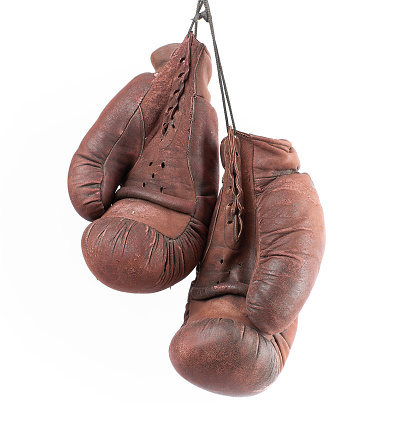
Boxing gloves that use real leather universally use cowhide leather. Cowhide leather’s most significant advantage is that it’s resistant to smells and odors that come from hours of keeping sweaty hands inside. When you need to clean them to deal with any odors, it’s easy because leather does not absorb water easily.
Most importantly, the leather construction is extremely durable and resistant to cracking and chaffing. A pair of genuine leather gloves, in theory, can last a fighter’s entire career, even with heavy use. This is why a pair of high-quality leather gloves from a company like Winning start at $350 and are the standard.
In fact, I could stop this article right here and tell you to pick up a pair of Winning Boxing Gloves, and no one would disagree. However, those gloves are out of the price range of many professional fighters, let alone amateur or hobbyist boxers.
Real leather boxing gloves are the gold standard because they’re long-lasting, durable, and they stay clean.
Polyurethane leather (synthetic leather)
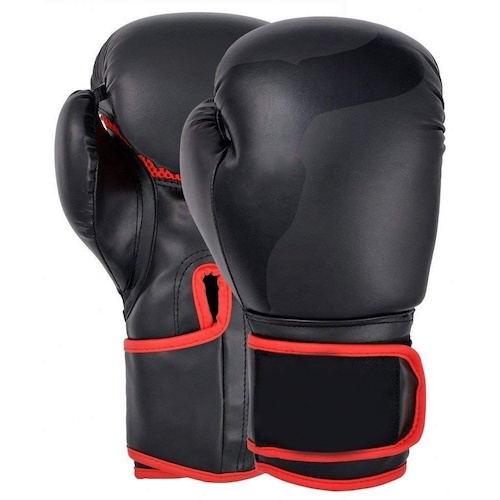
Polyurethane (PU) is the most common synthetic material that MMA and boxing gloves are made of these days. It’s a cost-effective alternative to leather, has superior durability to vinyl, and provides an excellent combination of flexibility, comfort, and aesthetics.
PU gloves are lightweight, making them ideal for sparring or punching bag work. Furthermore, there are a wide variety of quality levels available in terms of their exact material composition; affordable budget models can be easily found while still getting the same great features as more expensive premium options.
Vinyl
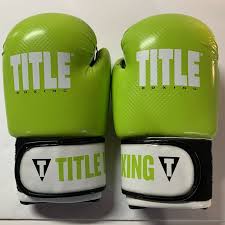
Vinyl is frequently used in boxing and MMA gloves since it’s inexpensive, simple to make, and easy to maintain. They don’t stand up to the beatdowns of heavy bag workouts, as vinyl is more vulnerable to cracks and less durable than other materials. It’s also not as comfortable.
In addition, vinyl tends to accumulate unpleasant smells with time because the material is less breathable. In fact, if you aren’t careful, these gloves can actually grow mold and mildew quite easily, as there is quite a lot of bacteria that floats around the boxing gym.
Here’s a great Reddit to read about the problem of mold and mildew on boxing gloves.
These are not smells that will easily come out. Mold is a real issue that synthetic of genuine leather simply doesn’t have to contend with. Combine this with the fact that they crack easily under heavy use, and you can see why these gloves are priced cheaply.
Glove weight and size
I will not cover the official weights and sizes for amateur or professional competition gloves. Not only have I covered that information in this article, but the gloves for any officially sanctioned competition are regulated and issued by the commission overseeing that bout.
An amateur or professional fighter will never have to supply his own gloves, so discussing that here is out of place.
Now, fighters do have to provide their own sparring gloves and gloves to hit the heavy bag. If you plan to take the sport seriously and you don’t want to share gloves with someone else, you’ll need to purchase at least two sets of training boxing gloves: one for hitting the heavy bag or focus mitts and another pair for sparring.
Sparring gloves are bigger to provide more protection for the fighters.
The lightest weight I’ve ever seen used is a 16 oz glove. These and 18 oz gloves are the most common, but I’ve seen them go all the way up to 22 ounces. This heavier glove weight is all in extra padding to protect the fighters as they work on skills against each other.
Bag gloves are lighter weight and have less padding, so you can feel the strikes against the bag, and the placement of your hand on the bag. The lighter gloves also allow you to work more on your skills without getting tired.
Boxing Lessons on Grit, Resilience, and Antifragility
In this e-book, I teach you 20 mindset lessons I learned from my 13-1-1 professional heavyweight boxing career.
Use these to conquer any challenges you face, in the ring or in life.
Learn how to develop the mindset of a fighter, from a fighter, so you can win the battles you face.
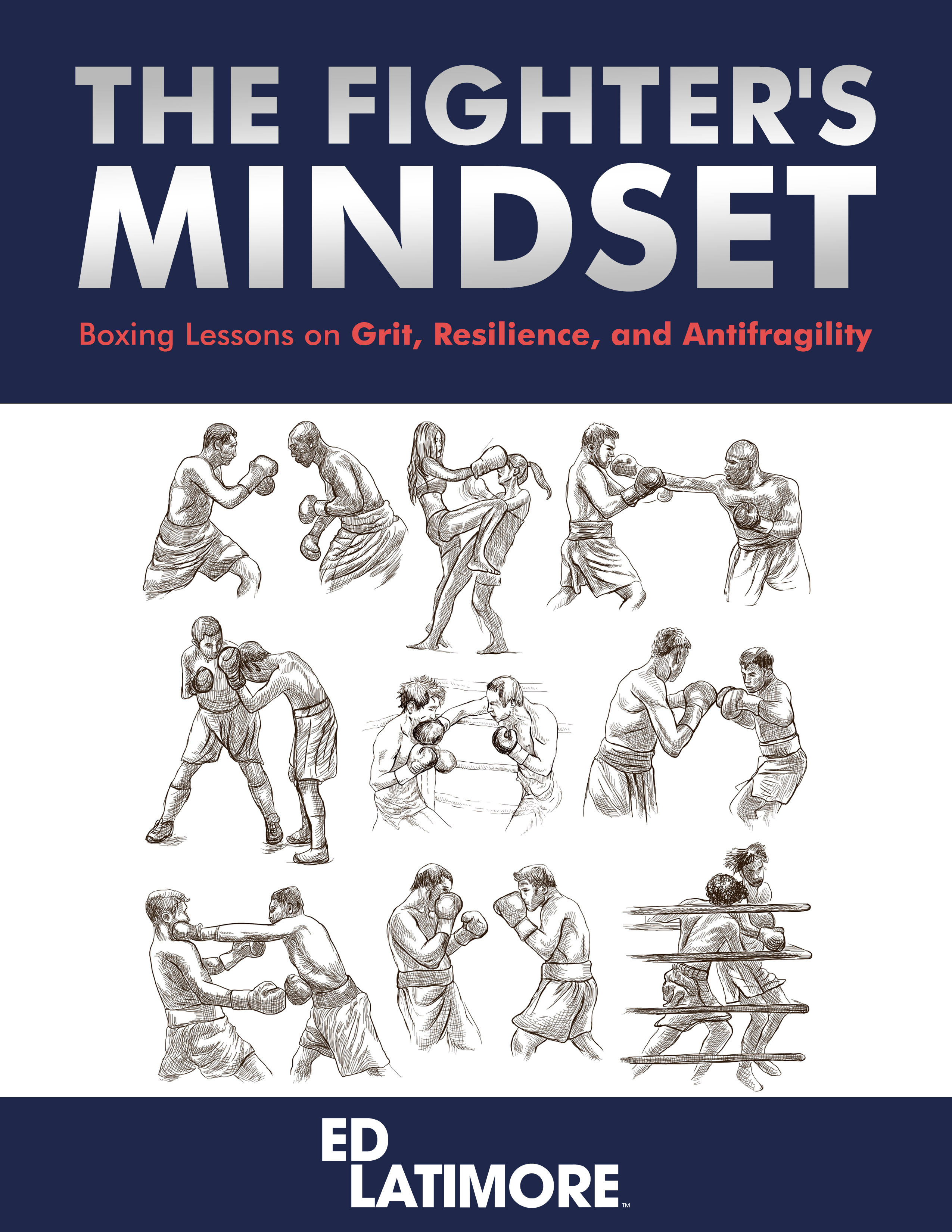
Padding in the boxing glove
This might be the most important thing to consider when you’re evaluating which gloves to get. Padding provides the cushioning needed to protect a boxer’s fists, wrists, and knuckles from any blow.
Padding also protects your training partner from getting too beat up, hence the need for bigger gloves during sparring. At this point, you may wonder why you’d want to protect your opponent’s face in an actual boxing match. Well, you don’t. In fact, it’s typical practice for a professional fighter “break-in” the gloves he gets before a fight.
That is, he tries to (within the rules) wear down the padding in the front of the glove so there is less padding between your knuckles and his face (this practice is strictly for professionals and is very much against the rules for amateur boxers).
Check the padding out on any glove to ensure that it not only keeps your hands safe but will keep you from getting banned from the boxing gym for sparring with dangerously small gloves.
Closure style
In this regard, there are only two types of boxing gloves: lace-up and velcro/hook and loop closure. They function exactly as they sound. The lace-up gloves need to be tied up for a secure fit, while the velcro/hook and loop closure stay on with just a velcro strap attachment.
Each has its pros and cons. It’s essential to consider your needs and goals relating to your training sessions before deciding which type of glove to get.
Velcro strap/Hook and loop gloves
These are technically the same type of glove. Until I started researching for this article to make sure that I got everything right, I’d actually never heard the phrase “hook and loop gloves.”
Just to make sure I wasn’t crazy, I went to look this up. According to HookandLoop.com:
Essentially, hook and loop is the generic name for VELCRO® Brand-type materials. Hook and loop is the name given to the fastening system which uses two sides of material, hook and loop. The hook is the rough, scratchy side and the loop is the soft, fuzzy side. When brought together, the sides of the hook and loop fabric attach and create a super strong bond, that can still be pulled apart when needed.
These gloves are quick to put on and provide good overall support and fit. Even when it comes to sparring, I’ve used and seen these types of gloves used by amateurs, professionals, and hobbyists alike
Pros
- Quick to put on and take off. Good if you’re short on time.
- You don’t need anyone else to help put them on. This is great for solo training sessions.
- There are different styles for different levels of support. Every company has a version of this glove.
- Cheaper than lace-ups. If you’re not quite ready to invest in top-level gear, these are fine for everything you need in the gym.
Cons
- Less wrist support than lace-up gloves. Even the best velcro strap glove can’t provide as much stabilization and support as a good lace-up glove.
- Less padding around the wrist. If you have good punching technique, this isn’t usually much of an issue. However, there came a point in my career where I was punching the heavy bag so hard that I needed the shock absorption that comes with lace-up gloves.
- Can scratch opponents. This is a biggie. any gym worth its salt will make you put tape around the velcro strap. This is common practice for lace-up gloves as well.
- Durability in the velcro strap. If you spend the money on a good pair of gloves, it will take a very long time and a bit of “overuse” before this is a problem. With that said, the strap can start to tear. The only way to avoid this is to not get the budget options.
Lace-up gloves
Lace-up boxing gloves have been available longer than their velcro counterparts and are either made from later (cowhide or buffalo) or synthetic leather (faux leather). As mentioned earlier, this means that they last longer but will be more expensive.
These are the gloves of top-level amateurs, professionals, and anyone who takes their training seriously.
Pros
- They provide the best protection and the snuggest fit. The fit of lace-up gloves is so tight I’ve had to loosen mine several times before sparring or a fight.
- Opponents are much safer. On the chance that you don’t wrap the wrist with tap, these gloves are designed to be used in competition, so little scratches don’t happen so easily.
- Extra padding and wrist protection. While good punching technique and hand wrapping already stabilize the wrist, these go a step further.
Cons
- You can’t put these gloves on alone. At least not well. Solo training sessions are done.
- They take longer to put on than lace and hoop gloves. Someone has put your hand in and tie the gloves up.
A final word on boxing glove recommendations
This list is far from complete. It’s simply born from my experience as a high-level amateur and professional heavyweight boxer.
You don’t have to take my recommendations, but I strongly recommend only taking the recommendations of another fighter or coach.
Best sparring gloves
Best sparring gloves
Winning Pro Gloves
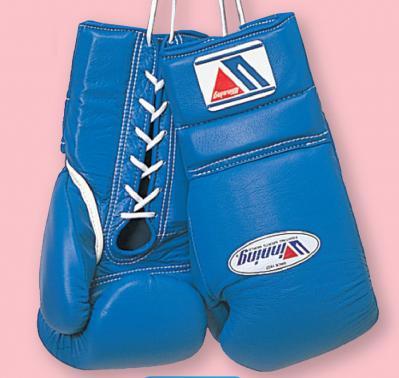 <figcaption>The softest and most protective gloves you can get your hands into</figcaption>
<figcaption>The softest and most protective gloves you can get your hands into</figcaption>One of the things that motivated me to write this article is that there wasn’t a single article that recommended Winning boxing gloves.
If you aren’t serious about your training, this doesn’t mean anything. But if you’re a real fighter or someone who takes pride in the equipment he has for the sport, this should strike you as odd.
Winning boxing products are hands down, the best in the business. They’re so good that each Winning Glove is authenticated. The reason why other sites don’t mention them is that Winning doesn’t do affiliates.
Hell, they don’t even do partnerships or endorsements with famous boxers. They simply produce a superior product and have let quality and word of mouth speak for themselves. But they are, by far, the most expensive glove on the market.
The cheapest place to get them is from the Winning’s site, and they start in the $300 range. No other glove will crack the $300 range.
Get winning boxing gloves here. I get no commission. They’re just a great product.
Note: For all the real boxers and boxing connoisseurs, Di Nardo’s Boxing gloves are not on this list because
- A $1000 boxing glove is not out of my absolute price range, but relatively speaking, I can’t imagine it being functionally much better than a Winning Glove—and that’s already expensive.
- I’ve never worn one or even seen one. It’d be dishonest to write about them.
**Also, I put Grant Gloves and Fly Gloves into a similar space. Those gloves are noticeably better than Rivals and Cleto Reyes, but marginally worse than Winning (in my humble opinion). Maybe I’ll do a piece comparing those and spring for a pair of DiNardo Boxing Gloves to sample. **
Rival RS 100 Series
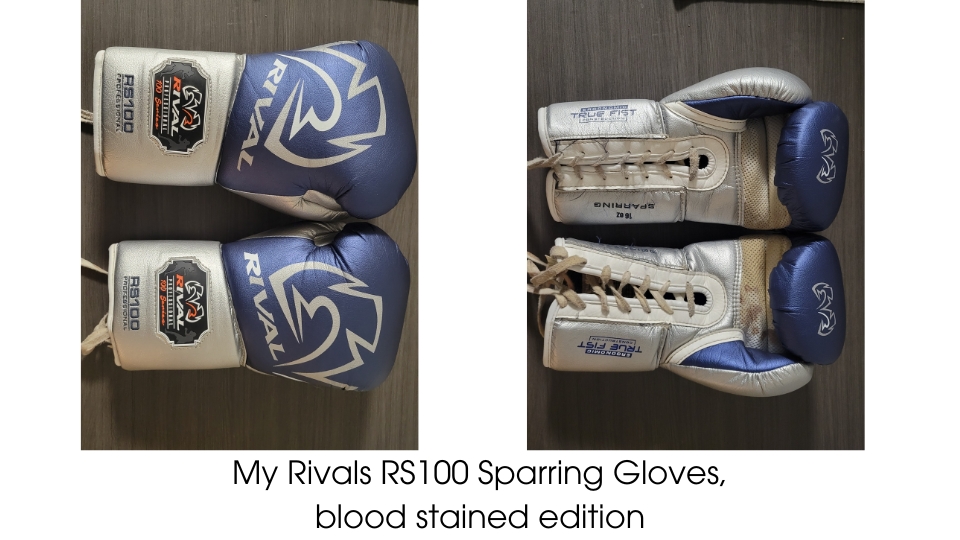
These are my preferred sparring gloves.
They fit well, are durable, and they protect your hand. I will say they aren’t the softest 16 oz gloves, but no one will ever feel like they got hit by a 10 oz competition glove.
High-quality boxing gloves are one of those things you can’t really appreciate until you’ve had some low-quality ones. Throughout my 12-year career, I’ve used some pretty bad sparring gloves. My main complaints were that they were either too tight or didn’t feel tight enough around my hand. The Rival RS 100 Series has none of those problems. This is likely due to a combination of features.
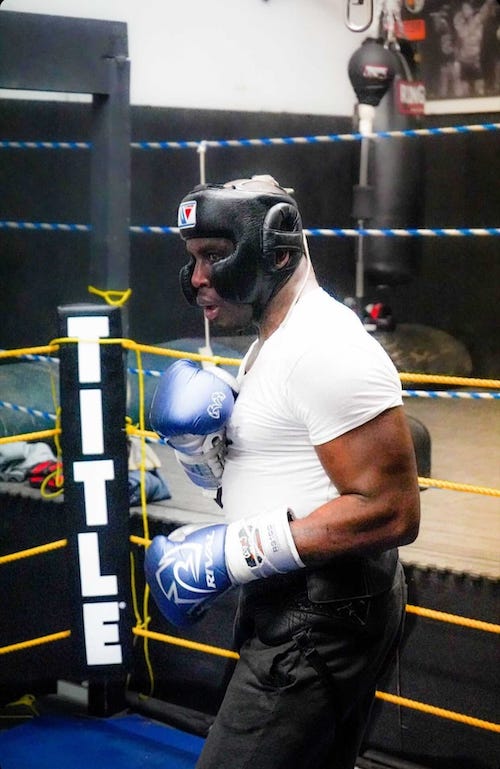
First, the laces are naturally angled, allowing for a tighter tie that doesn’t require as much force. The inside has a layered foam system, which comforts your hand (though, to support my observation that it’s not the most sparring partner-friendly glove that allows for greater force transmission). Lastly, there is a mesh palm interior to make them feel soft and breathable.
At $189, these gloves represent a decent investment, but I can’t give you any better recommendation that doesn’t put you into the $300+ range. Fortunately, I can tell you that the glove lasts, and cleans well, doesn’t hold odors, and the strings are long and thick so they don’t break.
Get the Rival RS 100 series here
Cleto Reyes
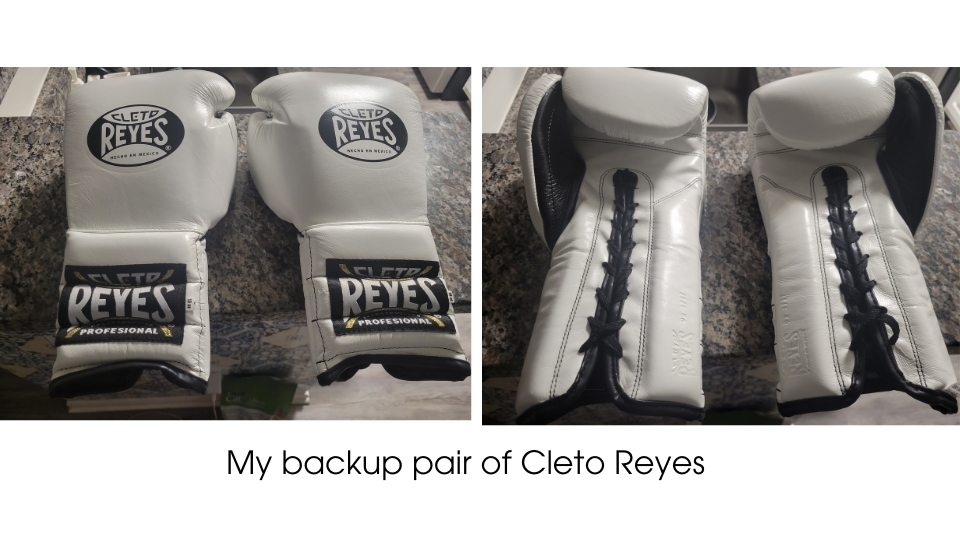
In my opinion, the single biggest difference between these two is that Cleto Reyes feels more like a sparring glove when you are hit by someone wearing them.
I’m not sure why, but this is likely due to the quality of leather that Cleto Reyes uses for the glove. I’m not saying that it’s a better-quality glove. Only your sparring partner will likely notice the difference. With that said, the reason why I rank this glove lower than the Rival RS 100 is that the hand padding simply isn’t that good.
I’ve never gotten a complaint from anyone over being hit by then (a sign that the padding is sufficient), but it doesn’t feel that way. I recognize that some might interpret this as a good thing, with the gloves being light and still not doing damage to the sparring partner, but the ONLY way they could do accomplish this is by having less wrist support and protection. And that’s exactly the case.
The wrist feels a little on the flimsy side, at least compared to the Rival RS 100. It’s not insufficient, but at a slightly higher price point than the Rival RS 100, I would expect to at least be comparable in this regard.
Still, the lightweight but breathable quality of these gloves, combined with the softer impact and knuckle support, makes these a solid second-place recommendation for lace-up gloves.
Best bag gloves
Winning Velcro Gloves
I’ve already waxed poetically about the quality of the Winning boxing products. Their velcro bag gloves are no different. If you have the money and are willing to spend it, you should absolutely invest in these gloves.
The only potential problem you’ll face with Winning Gear is getting it stolen. I’ve seen more than a few guys have their Winning gear disappear if they got careless with it at a fight or visiting another gym. However, I’m going to assume that if you spend $300 on a piece of boxing equipment, you’ll keep a close watch over it.
With that said, Winning is the best and you should get them if you can. I don’t care I don’t get any affiliate commission. I couldn’t do you the dishonor of telling you anything different.
Hayabusa T3 Kanpeki Gloves
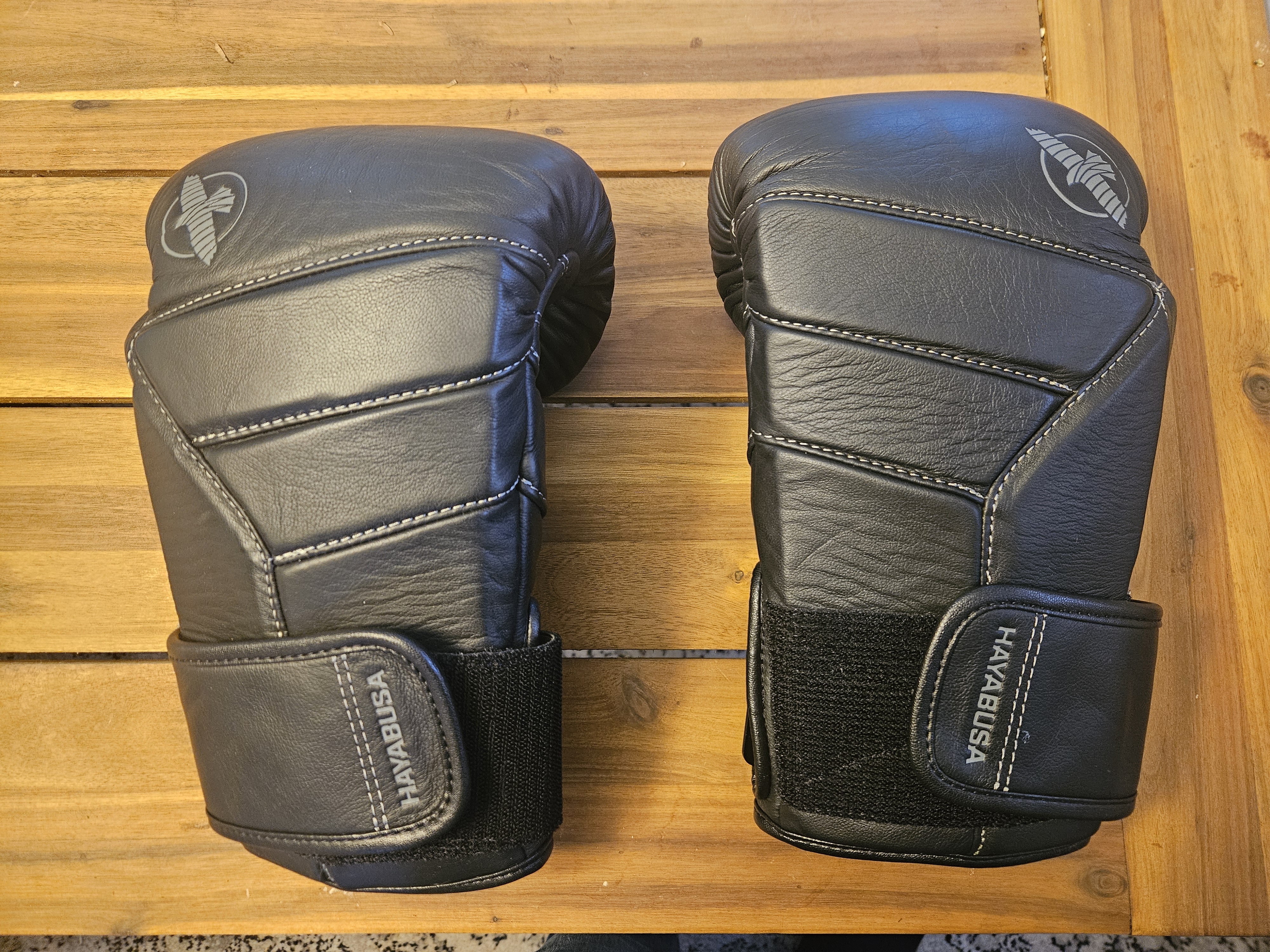
I decided to check these gloves out after Hayabusa reached out to me to try some of their products. I don’t receive any affiliate commission and didn’t receive any payment, but I got the gloves for free under the condition that if I thought they were solid, I’d mention them in this article.
Well, these gloves are so excellent that I’m thinking about dedicating an entire article to them. In the meantime, lemme tell you why I think these gloves should be your first choice if you don’t drop the $300+ on Winning Gloves.
For starters, Hayabusa managed to make a glove that has incredible padding and protection, but still feels like you’re making an impact when you hit the bag. The reason I prefer to hit the bag in 14 oz gloves is because I can feel the impact and contact more. It’s a powerful feedback mechanism for punch accuracy and technique, and I feel like I don’t get that in your typical 16 oz bag glove.
With the T3 Kanpeki, my fist feels simultaneously feels like I have the padding and protection of a 16 oz glove, but it feels so snug and tight that when I hit the bag, I honestly couldn’t believe I wasn’t in a 14 oz glove. This feature, by itself, won me over. But there’s even more…
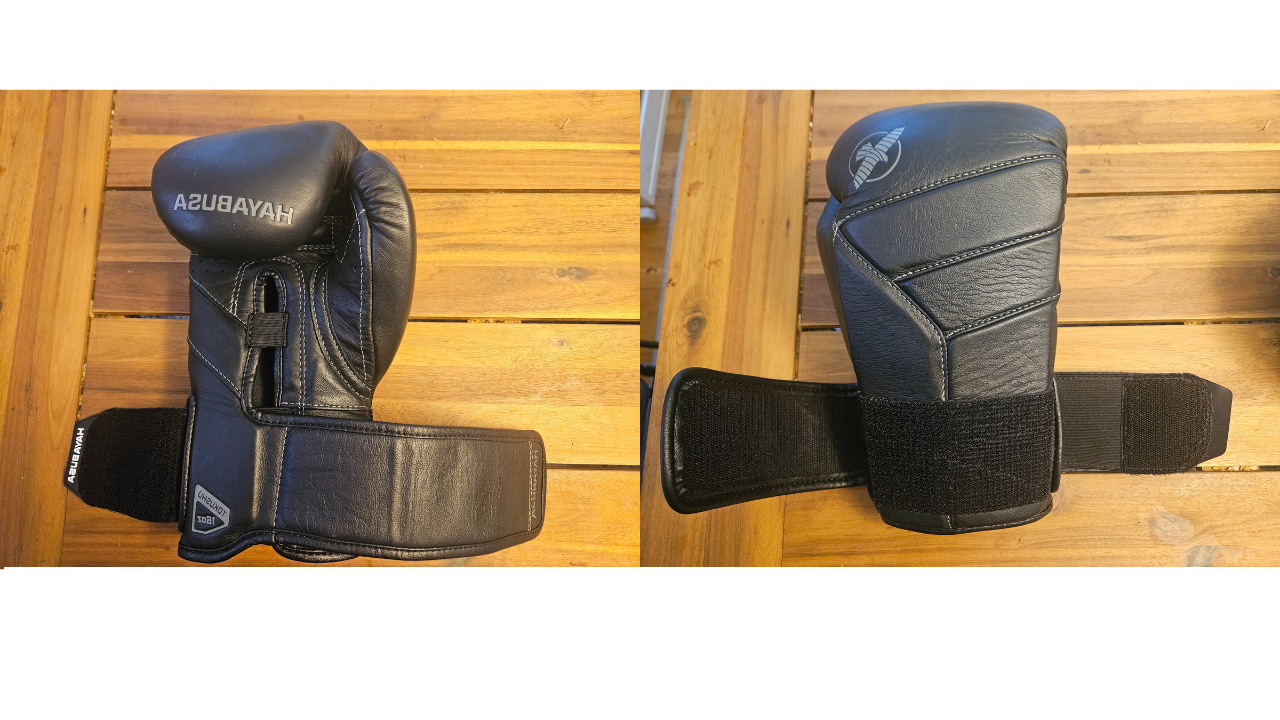
The T3 Kanpeki uses a double strap system for the wrist. Instead of just one velcro strap around the outside of the wrist, there are two that cross one another to create a snug feeling. Now, if you like to be able to quickly get your bag gloves on and off, this may not be for you. With that said, this design is still faster than tie-up gloves and, becuase the tension is distributed over two fasteners, the glove should last longer.
Everyone hates when the velcro in their gloves gives out because you can’t just add new velcro. You have to buy new gloves. This design should greatly extend the life of your gloves, which is why at $164, these gloves are an excellent investment. They’ll last long, keep your hands safe, and you won’t sacrifice the feeling of contact that you keep in lighter gloves.
Pick up a pair of T3 Kanpeki here
Also, check out the rest of Hayabusa’s line up.
Rival RB2 Super Bag Gloves
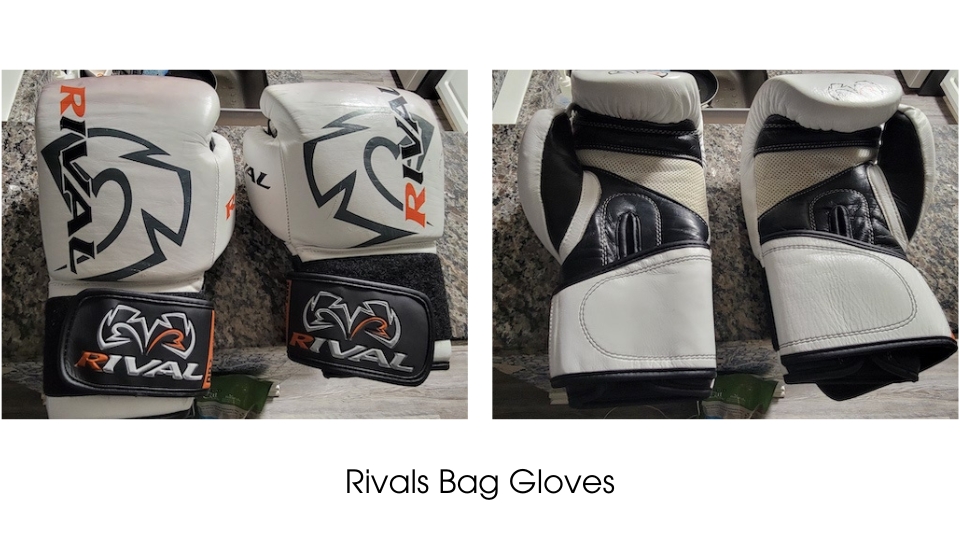
These were my favorite gloves before I discovered Hayabusa’s T3 Kanpecki. I swear I’m not some secret Rival fanboy. It just so happens that my both my bag and sparring gloves are both Rival products. I’d always owned the bag gloves, but the sparring gloves were the latest edition to my arsenal when I was the sparring partner for Roy Jones Jr.’s fight against Mike Tyson in 2020.
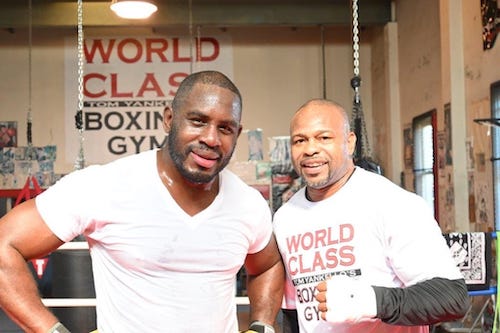
I like these gloves because they are everything a good bag glove should be. For starters, they’re easy to take on and off. After three years of relatively constant use, the velcro has remained strong with no signs of weakening. The glove does not hold sweat and does not hold odors either—and with how frequently I clean my gear, I’d know if they did.
The fit around the hand is excellent. Specifically, the glove is small enough to be a decent bag glove, but big enough to protect your knuckles and support your wrist. This is a delicate balance that most boxing gloves miss. However, the Rival RB2 Super Bag Glove is right on the money.
Venum Bangkok Spirit Nappa Leather Boxing Gloves
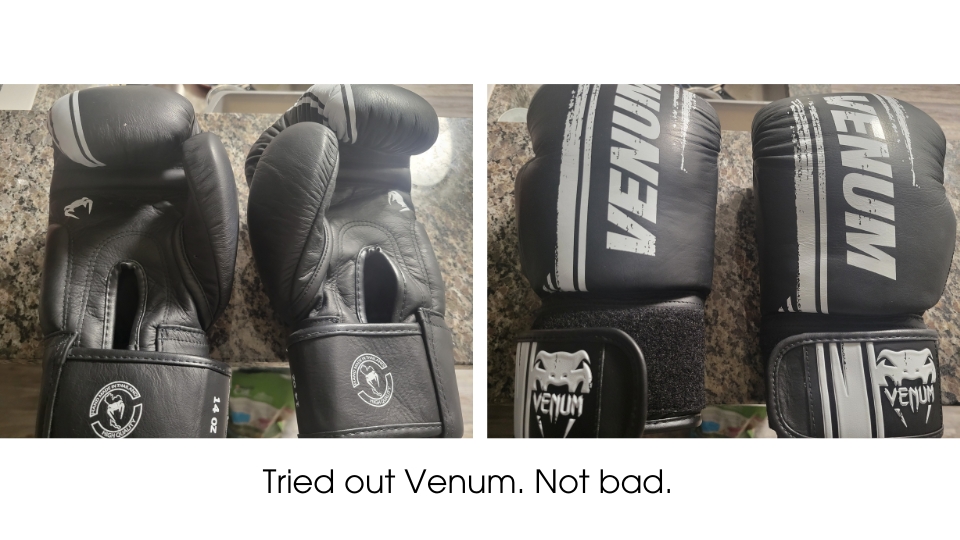 I grabbed these gloves on a recommendation. I talked to some boxing friends about what they thought was a decent alternative to the Rival RB2 Super Bag Gloves that I’ve been using for quite some time.
I grabbed these gloves on a recommendation. I talked to some boxing friends about what they thought was a decent alternative to the Rival RB2 Super Bag Gloves that I’ve been using for quite some time.
For the most part, I’m not disappointed with their recommendation. First, these are a great price without going into the bargain bin section. Boxing gear, more than most things, is a “you get what you pay for” type of industry. These gloves are cheaper than the Rival RB2’s, but the quality isn’t a big drop-off.
The single most impressive part of these gloves is the wrist strap. Really, they did a great job making your wrist feel secure. The ergonomics (how it fits around your hand) of the glove are pretty nice as well. The only place you notice the difference in price is in the fist padding.
I personally like my bag gloves to have as little padding in the first as possible so that I can get a good crack on the bag. You know, the type of punch that sounds like a shotgun. It’s difficult to accomplish that sound with too much padding.
The extra padding in the fist is the main difference between sparring and bag gloves. These gloves have a little too much padding in the fist, but if you’re a beginner, you probably won’t even hit hard enough to even notice.
Get the Venom Bangkok Spirit Nappa Leather Gloves here
Best cheap boxing gloves
Boxing is a poor man’s sport, but you still need to pick up some equipment. When I first started fighting, I hardly had any money to get any decent gear. In memory of those days, I put together this Amazon list of bag and sparring gloves under $50.
I didn’t bother doing research into boxing gloves in this price range because any glove that you spend less than $50 won’t be suitable for high level training, but they will serve as an introduction.
The three companies I recognize in this group are RDX, Everlast, and Title. I’m not overly familiar with RDX, but they seem to have plenty of good reviews and I’ve seen them in the gym. I obviously recommended spending more on any of the recommendations above, but I get it if you can’t.
Best gel-hand protection/wrist support
Everlast Evergel Handwraps
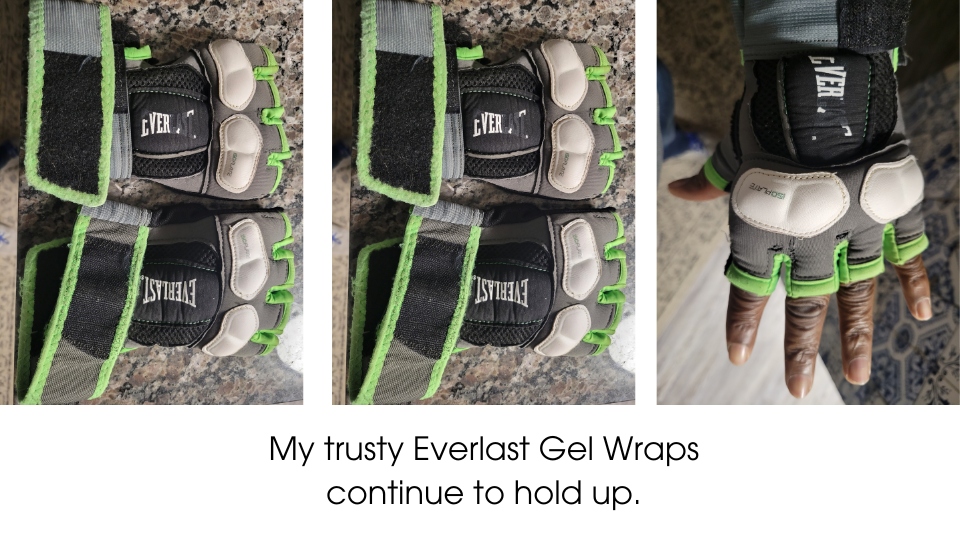
Rather than using traditional hand wraps, I’ve always preferred to use these.
Don’t get me wrong. I have nothing but love for traditional cloth wraps, and I think every fighter should know how to wrap their hands, but these are faster and easier to use. Not only that, but they provide extra padding for your knuckles.
Now, at $27 a pair, these are quite costly compared to basic cloth wraps, but it’s easy to see where the money is spent. they’re a tight fight around your hand and they’re held in place with a velcro strap. They don’t hold on to odors and they’re pretty durable and long-lasting, as they should be at $27 a pair.
Get your everlast gel wraps here
The final word on boxing glove recommendations
This list is far from complete. It’s simply born from my experience as a high-level amateur and professional heavyweight boxer.
You don’t have to take my recommendations, but I strongly recommend only taking the recommendations of another fighter or coach.
Boxing Lessons on Grit, Resilience, and Antifragility
In this e-book, I teach you 20 mindset lessons I learned from my 13-1-1 professional heavyweight boxing career.
Use these to conquer any challenges you face, in the ring or in life.
Learn how to develop the mindset of a fighter, from a fighter, so you can win the battles you face.



